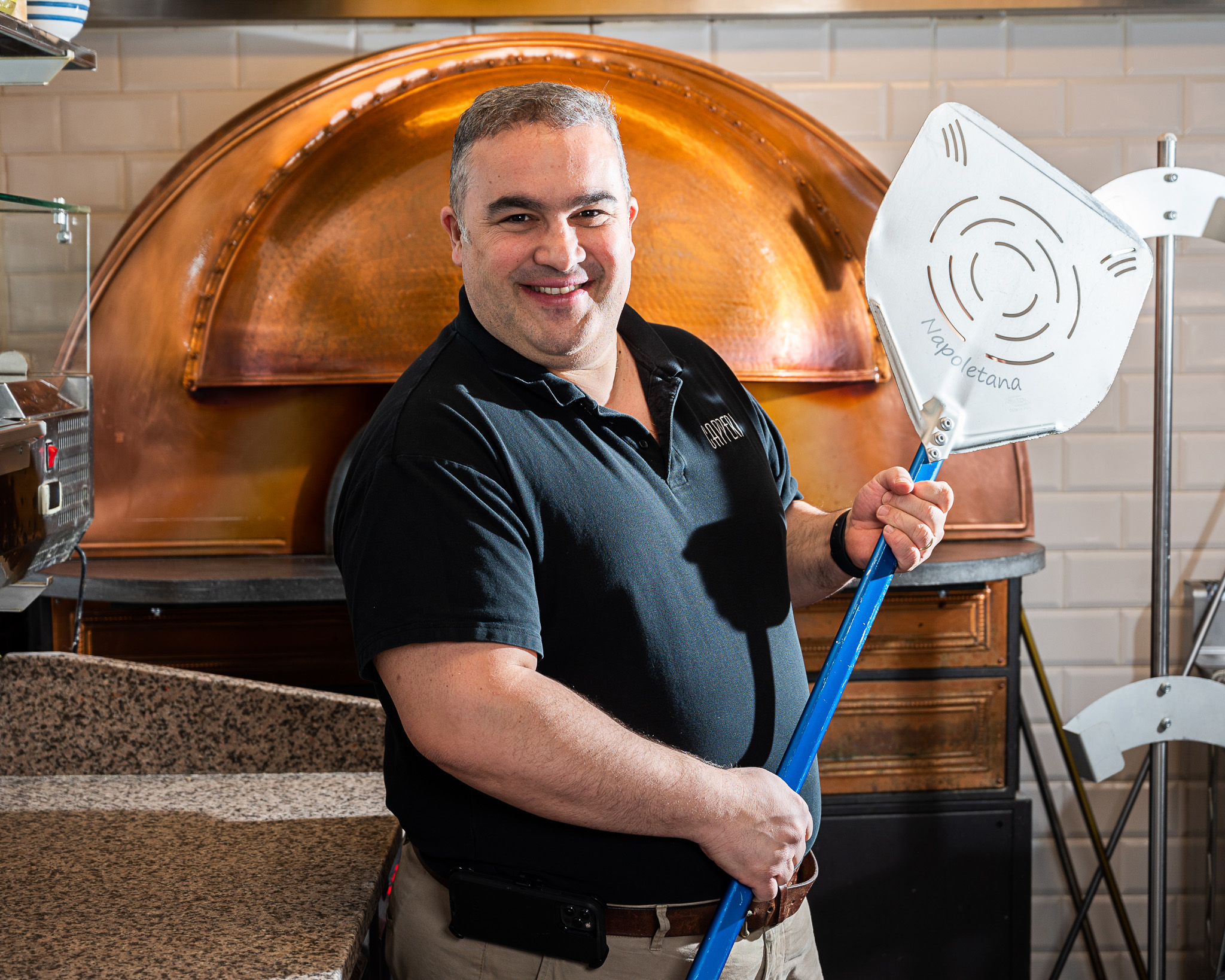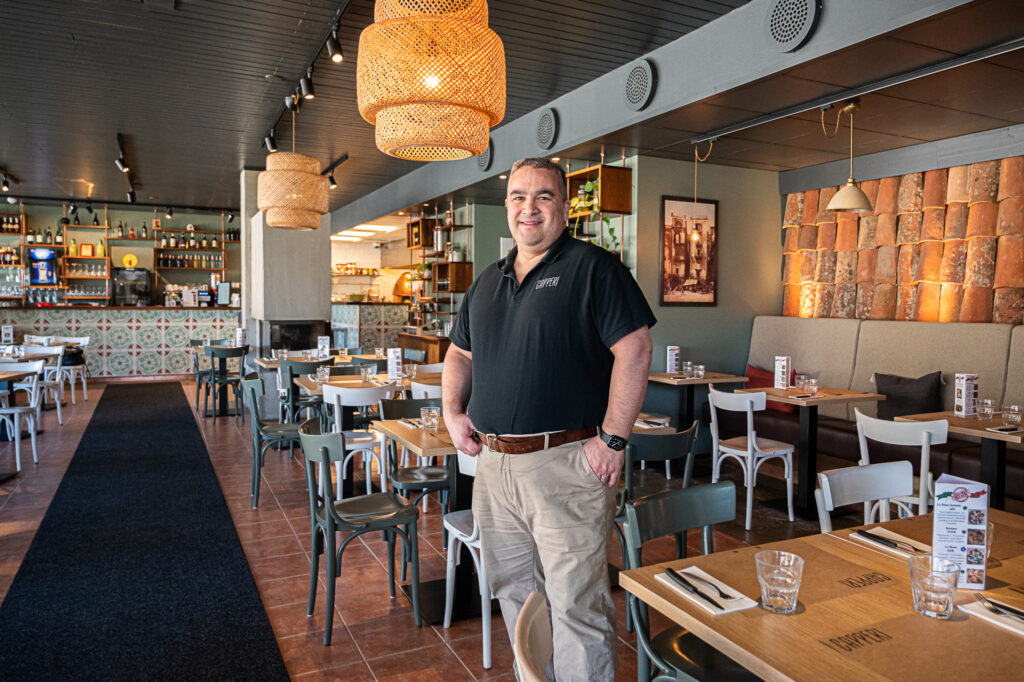From dead silent neighbours to the best pizza in town – Miguel worked his way into success

Tuiaara Linnala
Sercan Alkan
Published 13.05.2024 at 1:43
Updated 13.05.2024 at 1:43
A sunny May morning hints that the long-awaited summer is finally arriving. In Oulunkylä, Helsinki, Italian restaurant Capperi waits for the first visitors of the day.
The co-owner of the restaurant, Miguel Angel Papaianni, arrives at 10 am sharp with a wide and honest smile on his face.
“Hola! Esta bien?” he greets in Spanish, but quickly switches to English and offers coffee.
In Oulunkylä, Papaianni is far away from his original home.
He was born in Argentina to an Italian family, a cultural background that has followed Papaianni throughout his life. He can recall how in his childhood his family and other relatives gathered to prepare salamis or make tomato sauce for the whole year.
The Italian heritage is visible also in Capperi restaurant.
When entering the bright restaurant space, the first thing one notices is a decorated wall of tiles. Each tile was made over a hundred years ago and carefully brought from Italy. Nothing is adapted to be familiar to a Finnish person. Instead, everything screams “it is a piece of Italy”.
Papaianni is a man full of energy, who tells about his life experiences happily and openly. While doing so, his hands gesticulate actively and he constantly bursts into laughter, which fills the room with southern warmth.
And of course, the owner of an Italian restaurant has an opinion about the hottest topics related to Italian cuisine.
“It is not criminal to add pineapples to pizza”, Papaianni says with a teasing smile on his face. “But it is criminal to add parmesan cheese to a seafood pasta, especially to a shrimp pasta.”
Why can’t the Finns open their mouths?
Miguel Papaianni moved to Helsinki with his family in 2014 from Buenos Aires, Argentina. He had met a Finnish woman, and the couple already had three kids. Argentina’s unstable economy led the family to look for a new home in the home country of Miguel’s wife.
Miguel had visited Finland before for holidays, but that didn’t offer full picture of what the country was like. After he moved here permanently, the cultural differences became visible.
In the beginning, Papaianni struggled with the lack of communication between people in public. When sitting in a bus, the Finns wouldn’t say in advance that they were about to leave the bus at the next stop. They just started to move in their chair, Papaianni recalls.
“I had to ask them if they needed to leave. Only then they would reply, but why didn’t they ask earlier? I couldn’t understand it.”
Similar things happened even among neighbours.
“When I started my Finnish language course, I had to walk to the bus stop. There I met my neighbour”, he tells. “He started to stare at me from more than 100 meters, and when we crossed the sidewalk, the man turned his head, ignored me and walked away.”
Papaianni felt offended.
“In my country, it’s considered bad upbringing to stare at someone and not greet them.”
The same thing happened the day after, and the following day, and the day after that. Every time Miguel Papaianni stubbornly wished the neighbour good morning.
After multiple attempts, the neighbour finally replied with a nod. And eventually even smiled and wished back good morning out loud.
“I was so happy”, Papaianni says. “I thought: finally, I got him!”
Now he thinks that it just takes time for a Finn to start trusting a new person, especially when he or she comes from another country and speaks another language. For instance, when doing business, things tend to go smoother, when a Finn can talk to another Finn.
“That’s why I have left that kind of things to my Finnish partners.”
For Papaianni, Capperi is not just a pizza restaurant
The idea of opening an own restaurant came in 2017.
“The husband of my wife’s cousin came to my house and asked if I wanted to join in opening a restaurant because I have experience”, Papaianni explains. ”And I said yes.”
Back in Argentina, Papaianni had worked as a general manager at the Hilton Hotel, where he opened two restaurants and a small pizzeria at the swimming pool. In Finland he had spent his first years learning the language and doing preparatory work for possible new restaurant.

Capperi was a project of five people. From the beginning, the idea was clear: to open a family restaurant, but not downtown. It had to be located in the suburbs, Papaianni says.
“We saw a need for it because also we had small children. If you wanted to go and eat with your family, you had to go downtown or to a special place, but we wanted to offer people a place that would be close to their homes.”
At the time, in the surroundings of Helsinki, there were mostly only small pizzerias, kebab restaurants, and takeaways. Papaianni and his friends recognized a need for a welcoming space, where families could gather and enjoy quality time together without distractions.
“We wanted not only to sell pizza. You can get pizza from anywhere, but coming to Capperi, it has to be a mark of quality.”
From the beginning, Capperi has relied on ingredients imported from Italy. The cheese, tomatoes, and artichokes – all have come from the same supplier to this day, Pappaianni says.
“We want to invite customers to a gastronomic travel in their minds. The best possible reward is when I hear people saying things like ‘do you remember when we were in Tuscany or Naples?’ I want to transport the customer to their best experience in Italy when they come to Capperi.”
Father’s advice: working hard helps you to get lucky
Currently, there are two Capperi restaurants. Their pizzas have gained a reputation and won prices. One could easily call Miguel Papaianni’s time in Finland a success story.
When asked for advice on how to thrive in Finland, Papaianni emphasizes on adapting to a new culture, while still maintaining one’s values.
“Finnish society is based on trust. If you don’t show it, then you can’t integrate at all. If you promise something to a Finn, he will trust you because you said so. You can’t lie, twist things, or make things that benefit just you by going over someone.”
Another thing Papaianni calls for, is hard work.
“Put your sleeves up and start doing something. It doesn’t matter what you do; if you do it really well, the main thing is to start, and then opportunities will come.”
“My father used to say, ‘You want luck? You have to help it.’ I always kept this idea in my head.”
For Papaianni it’s also about proving one’s worth.
“If you stay with the attitude that I will not work unless I am the general manager of the company, then you will be unemployed. But if you concentrate on starting work and doing it well, there is no boss who wouldn’t appreciate a good employee and give opportunities to such a person.”
Papaianni points to an example in his own company, his chief pizza maker Omar.
“He came to us four years ago and asked for a job. At that moment, I could offer him only a dishwashing position, and he took it. Now he can cook the best Napolitan pizza in town.”